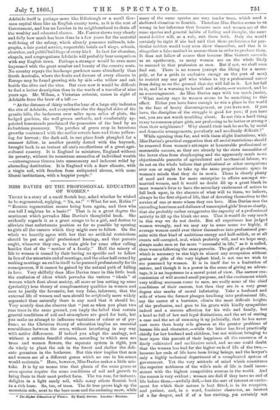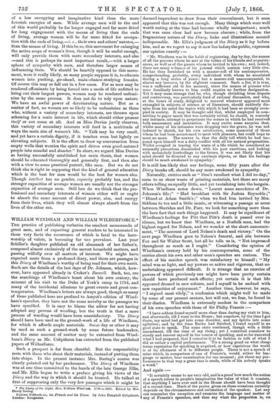MISS DAVIES ON THE PROFESSIONAL EDUCATION OF WOMEN.*
THERE is a story of a small Scotch boy, asked whether be wished to be regenerated, replying, " Na, na !" " What for not, Robin ?" 46 Because regeneration means being born again, and then wha can tell I mightna be a lassie ?" That is in a great degree the -sentiment which pervades Miss Davies's thoughtful book. She evidently regards it as a great scrape to be a girl, and desires to alleviate that unfortunate position as far as possible by opening to girls all the careers which they might care to follow. On the whole we heartily agree with her that no artificial restrictions should be put on girls' professional leanings, and that parents ought, whenever they can, to train girls for some other calling besides that of the " mother of a family." Half the misery of life to women is caused by their having no specific end to follow in lieu of the uncertain end of marriage, and the other half caused by making marriage an end in itself to be pursued professionally for its consequences, if it cannot be gained by the natural path of falling in love. Very skilfully does Miss Davies trace in this little book the confusion of ideas which pervades the various " ideals " of women which float about society, all more or leas setting up some (probably) true theory of complementary qualities in women and men to justify the favourite, but very false, inference, that the external life of women and men should be artificially more widely separated than naturally there is any need that it should be. Very acutely does she observe that "just as when you plant two rose trees in the same ground, you imply the belief that certain general conditions of soil and atmosphere are good for both, but you make no attempt to influence variations of colour or of per- fume, so the Christian theory of education implies an essential resemblance between the sexes, without interfering in any way with native differences. If indeed you adopt the analogy, not without a certain fanciful charm, according to which men are trees and women flowers, the separate system is right, you do wisely to plant the oak in the forest and shelter the deli- cate geranium in the hothouse. But this view implies that men and women are of a different genus which no one in his senses would maintain." Here, however, Miss Davies makes a little mis- take. It is by no means true that plants of the same genus or even species require the same conditions of soil and growth to bring them to their most perfect form. The tea rose, for instance, delights in a light sandy soil, while many others flourish best in a rich loam. So, too, of trees. The fir tree grows high up the mountain side, next to the bare moss and the enduring snow, while • Zlie Higher Education, of Women. By Emily Davies. lauclmi: &rah= many of the same species are very tender trees, which need a sheltered situation to flourish. Therefore Miss Davies seems to us wrong in her inference that because men and women are of the same species and general habits of feeling and thought, the same moral habitat will, as a rule, suit them both. Only she would certainly be right if she had said that these preferences for par- ticular habitats would very soon show themselves, and that it is altogether a false method to assume them in order to produce them. It does not follow of course that because Miss Garrett succeeds as an apothecary, as many women are on the whole likely to succeed in that profession as men. But if not, we shall soon find out. There is no reason (except the liking for a mono- poly, or for a pride in exclusive energy on the part of men) to restrict any one girl who wishes to try a professional career from doing so on the ground that she will fail in it. Let her fail in it, and be a warning to herself and others,—or succeed, and be an encouragement. As Misa Davies says with too much justice, " What society says to women seems to be something to this effect. Either you have force enough to win a place in the world in the face of heavy discouragement, or you have not. If you have, the discipline of the struggle is good for you ; if you have not, you are not worth troubling about. Is not this a hard thing to say to common-place girls, not professing to be better or stronger , than their neighbours? Why should their task be made, by social and domestic arrangements, peculiarly and needlessly difficult 2" While agreeing thus far, and with these slight limitations, with Miss Davies's practical suggestion that all social restrictions should be removed from women's attempts at honourable professional or mercantile careers, as they are already by the stern necessities of the lower class from shopkeeping and the apparently much more objectionable pursuits of agricultural and mechanical labour, we do not on the whole believe that professional or other occupations ever can or ought to take up the same proportionate space in women's minds that they do in men's. There is clearly plenty of need and room for more enterprise in affairs amongst un- married women, and it would no doubt fill up a great blank in most women's lives to have the secondary excitement of action to fall back upon, in the absence of what will to them, we believe, always be the first object of life, that of devoting themselves to the service of one or more whom they can love. Miss Davies sees the exceeding heaviness and dullness of unoccupied girls' lives so clearly, that she probably rather exaggerates the capacity of a professional activity to fill up the blank she sees. That it would do very much in this way we do not doubt. But all experience has judged women wrongly, and we may say in some sense too highly, if average women could ever throw themselves into professional pur- suits with that kind of ambitious energy and half-selfish, or at all events self-occupied, zeal, which probably will, and we hope may, always make men so far more " successful in life," as it is called, than women following the same pursuits. The gift of go-aheadness, which is necessary to rise high in almost any occupation without genius or gifts of the very highest kind, is not one we wish to see possessed by women. It is in itself due to a limitation of nature, and though it is a power in the sense of giving an advan- tage, it is an impotence in a moral point of view. The narrow con- centration of will around small purposes, and the excitement which very trifling successes cause to men, are really some of the chief conditions of their success, but then they are in a very great degree also marks of moral inferiority. Take a husband and wife of whom the former plunges headlong into professional life, say the career of a barrister, climbs the most difficult heights of the profession, and goes to his grave with kindly sympathies indeed and a sincere affection for his wife and family, but a head so full of law and legal distinctions, and the art of stating a case and the art of summing it up judicially, that he has never cast more than hasty side glances at the greater problems of human life and character,—while the latter has lived practically chiefly for her husband and children, but not without bringing to bear upon this pursuit of their happiness all the resources of a finely cultivated and meditative mind, and no one could doubt that the woman has had far the higher ends of life of the two,— because her ends of life have been living beings, and the lawyer's only a highly technical department of a complicated system of government. Yet the very attitude of mind which constitutes the superior nobleness of the wife's ends of life is itself incon- sistent with the highest competitive success in the world. And the reason is very evident ; women are dull if they have no end of life before them,—awfully dull,—but the sort of interest or excite- ment for which their nature is best fitted, is in its receptive, and patient, and, in a word, feminine character, an interest of a far deeper, and if of a less exciting, yet certainly not of a less occupying and imaginative kind than the more feverish energies of men. While average men will to the end of this world probably be far longer engaged and far more fitted for long engagement with the means of living than the ends of living, average women will be far more fitted for occupa- tion with the ends of living,—i. e., their own and others' natures,— than the means of living. If this be so, this movement for enlarging the active scope of women's lives, though it will be useful enough, will only provide them with more secondary interests, and also —and this is perhaps its most important result,—with a larger sphere of sympathy with men, and therefore larger means of influencing them. We should be heartily opposed to this move- ment, were it really likely, as many people suppose it is, to educate women into pushing, go-ahead, main-chance-studying females. Of course this may so fall out in a few cases. For as men may be rendered effeminate by being forced into a mode of life unfitted to bring out their largest powers, women may be rendered unfemi- nine by the same process. It does not do to rely upon nature. We have an awful power of deteriorating nature. But as a matter of fact, no women are so likely to be unfeminine as those who, without a variety of secondary interests, are thrown upon scheming for a main interest in life, which should either present itself or not come at all. And as Miss Davies justly observes, this variety of secondary interests will feed in a multitude of ways the main aim of women's life. " Talk may be very small, and yet have a certain dignity, if it touches even but lightly on elevating subjects. It is the effort to draw up conversation from empty wells that wearies the spirit and drives even good-natured people into scandal and slander." In short, we regard Miss Davies as having successfully established her main thesis, that women should be educated thoroughly and generally first, and then also with a view to some practical pursuit, like men. But we do not think she is right in supposing that the kind of general education which is the best for men would be the best for women also. Though intellect has no gender, capacity probably has, and the stronger capacities of average women are usually not the stronger capacities of average men. Still less do we think that the pro- fessional and secondary interests of women either will or ought to absorb the same amount of direct power, aim, and energy from their lives, which they will almost always absorb from the lives of the other sex.































 Previous page
Previous page